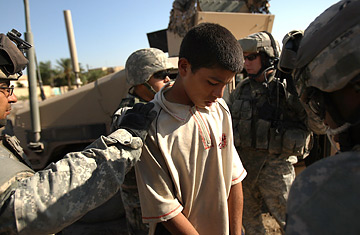
A young man suspected of planting an explosive device is detained in U.S. troops in the Ghazaliyah neighborhood.
President Bush made a politically astute choice by flying into al-Asad Airbase in Iraq's Anbar province for Monday's surprise trip. His stopover allowed him to highlight the striking success the U.S. has had in Anbar this year turning Sunni groups against al-Qaeda in Iraq. But his decision to avoid Baghdad is telling: it is in the Iraqi capital, not Anbar, where America's warming relationship with the Sunnis is running up against Iraq's complicated and often savage sectarian conflict.
Recounting for U.S. troops his meeting with Sunni tribal sheikhs, Bush said "they told me that the kind of bottom-up progress that your efforts are bringing to Anbar is vital to the success and stability of a free Iraq." Bush and others have begun speaking enthusiastically of that kind of "bottom-up" reconciliation, and Anbar is the chief example. But the Anbar tribes have made progress and reconciled with the American military, not with the Shi'ite government. Prime Minister Nouri al-Maliki met Monday with Anbar power broker Sheikh Abdul Sattar al-Rishawi, but that does not signify progress at ground level.
Ghazaliyah, a neighborhood that sits on Baghdad's sectarian fault line, is a case study in the promise and the peril of U.S. cooperation with their Sunni former enemies. The American battalion in Ghazaliyah is trying a variation of the Anbar strategy and has hired several hundred Sunni volunteers to work as a security force called the Ghazaliyah Guardians. For now they are limited to working at checkpoints with the Iraqi Army, and each unit is allowed to share only two AK-47s. The eventual goal, though, is to bring them into the Iraqi Security Forces as the local police.
The need for police in southern Ghazaliyah is acute because the official, Shi'ite-dominated Iraqi Police force is so infiltrated by Shi'a militia elements that it can hardly function. And even an honest Shi'ite cop would be foolish to venture into the neighborhood's Sunni strongholds. "The police force we have in Ghazaliyah doesn't come down here," said Capt. Jon Brooks, who has commanded a company in southern Ghazaliyah since the spring. "They're predominantly Shi'a; I have a predominantly Sunni area. They haven't been down here the entire time I've been out here."
The Guardians program is in its infancy, but American commanders here say they are already seeing results. At one checkpoint the Guardians recognized a local al-Qaeda fighter and detained him; the Iraqi Army soldiers at the checkpoint would have let the man pass. Brooks said having men policing their own neighborhoods was vital to long-term progress in Ghazaliyah. "They've seen the security in the area greatly increase," Brooks said. "They can take it a step further and, hopefully, sustain it over the long term." The Guardians can only become the local police, though, if the national government gives its approval.
Already, the U.S. military's new allies see the Shi'a-dominated government as a hindrance. Abu Omar, a former officer in the Saddam-era army who helped organize the Guardians, said that he expects the government to scuttle the program. The Americans share some of his concerns, to the point of withholding the Guardians' identities from the Iraqi military and government. "We're too scared of what might happen with those names once they get to the government level," said Maj. Tom Moore, 33, the battalion's intelligence officer. Like the Guardians themselves, the Americans fear corrupt or militia-affiliated members of the Interior Ministry or the government might target Guardians for assassination.
The Americans acknowledge that some of the Guardians probably fought as insurgents against the U.S. military and the Iraqi government. But unlike in Anbar and the Baghdad neighborhood of Amriyah, where whole groups of insurgent fighters turned on jihadists, in Ghazaliyah the Guardians are truly an organization built from scratch and inserted into the community to increase local security. In that sense it provides a truer test of the Iraqi government's goodwill; if Shi'ite leaders cannot accept a group like the Guardians, it's hard to imagine what kind of local Sunni police force would pass muster. "It's a hot-button issue with a lot of people," Brooks said. "There's some trust to be built between these security forces and the Iraqi Army. We're not going to push the project past anybody's comfort level. We're skirting the edge of it right now."
Trust has been building very slowly; it took some negotiating to convince the Guardians to reveal their first names to the soldiers they work with at the checkpoints. On Monday Brooks visited a checkpoint and worked to get to the bottom of an incident where an Iraqi soldier fired into the air to get the attention of a Guardian whom he felt was ignoring procedure. Brooks brought the soldier in command of the checkpoint together with the top Guardian on duty and elicited a single version of events. Before leaving, the laid-back captain urged the two men to work together. "It seems like you're cooperating 'this much,'" Brooks said, holding a finger from each hand close together. Then he spread his palms farther apart. "I need you to cooperate 'this much'."
That is a truer assessment of where things stand on the streets of Baghdad than anything in the President's speech.
